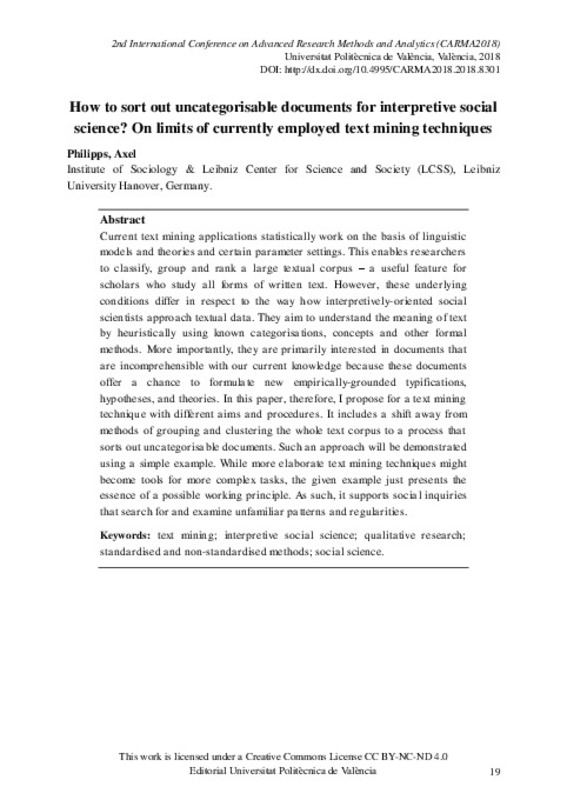JavaScript is disabled for your browser. Some features of this site may not work without it.
Buscar en RiuNet
Listar
Mi cuenta
Estadísticas
Ayuda RiuNet
Admin. UPV
How to sort out uncategorisable documents for interpretive social science? On limits of currently employed text mining techniques
Mostrar el registro sencillo del ítem
Ficheros en el ítem
| dc.contributor.author | Philipps, Axel
|
es_ES |
| dc.date.accessioned | 2018-11-02T11:10:00Z | |
| dc.date.available | 2018-11-02T11:10:00Z | |
| dc.date.issued | 2018-09-07 | |
| dc.identifier.isbn | 9788490486894 | |
| dc.identifier.uri | http://hdl.handle.net/10251/111751 | |
| dc.description.abstract | [EN] Current text mining applications statistically work on the basis of linguistic models and theories and certain parameter settings. This enables researchers to classify, group and rank a large textual corpus – a useful feature for scholars who study all forms of written text. However, these underlying conditions differ in respect to the way how interpretively-oriented social scientists approach textual data. They aim to understand the meaning of text by heuristically using known categorisations, concepts and other formal methods. More importantly, they are primarily interested in documents that are incomprehensible with our current knowledge because these documents offer a chance to formulate new empirically-grounded typifications, hypotheses, and theories. In this paper, therefore, I propose for a text mining technique with different aims and procedures. It includes a shift away from methods of grouping and clustering the whole text corpus to a process that sorts out uncategorisable documents. Such an approach will be demonstrated using a simple example. While more elaborate text mining techniques might become tools for more complex tasks, the given example just presents the essence of a possible working principle. As such, it supports social inquiries that search for and examine unfamiliar patterns and regularities. | es_ES |
| dc.format.extent | 9 | es_ES |
| dc.language | Inglés | es_ES |
| dc.publisher | Editorial Universitat Politècnica de València | es_ES |
| dc.relation.ispartof | 2nd International Conference on Advanced Reserach Methods and Analytics (CARMA 2018) | es_ES |
| dc.rights | Reconocimiento - No comercial - Sin obra derivada (by-nc-nd) | es_ES |
| dc.subject | Web data | es_ES |
| dc.subject | Internet data | es_ES |
| dc.subject | Big data | es_ES |
| dc.subject | QCA | es_ES |
| dc.subject | PLS | es_ES |
| dc.subject | SEM | es_ES |
| dc.subject | Conference | es_ES |
| dc.subject | Text mining | es_ES |
| dc.subject | Interpretive social science | es_ES |
| dc.subject | Qualitative research | es_ES |
| dc.subject | Standardised and non-standardised methods | es_ES |
| dc.subject | Social science | es_ES |
| dc.title | How to sort out uncategorisable documents for interpretive social science? On limits of currently employed text mining techniques | es_ES |
| dc.type | Capítulo de libro | es_ES |
| dc.type | Comunicación en congreso | es_ES |
| dc.identifier.doi | 10.4995/CARMA2018.2018.8301 | |
| dc.rights.accessRights | Abierto | es_ES |
| dc.description.bibliographicCitation | Philipps, A. (2018). How to sort out uncategorisable documents for interpretive social science? On limits of currently employed text mining techniques. En 2nd International Conference on Advanced Reserach Methods and Analytics (CARMA 2018). Editorial Universitat Politècnica de València. 19-27. https://doi.org/10.4995/CARMA2018.2018.8301 | es_ES |
| dc.description.accrualMethod | OCS | es_ES |
| dc.relation.conferencename | CARMA 2018 - 2nd International Conference on Advanced Research Methods and Analytics | es_ES |
| dc.relation.conferencedate | Julio 12-13,2018 | es_ES |
| dc.relation.conferenceplace | Valencia, Spain | es_ES |
| dc.relation.publisherversion | http://ocs.editorial.upv.es/index.php/CARMA/CARMA2018/paper/view/8301 | es_ES |
| dc.description.upvformatpinicio | 19 | es_ES |
| dc.description.upvformatpfin | 27 | es_ES |
| dc.type.version | info:eu-repo/semantics/publishedVersion | es_ES |
| dc.relation.pasarela | OCS\8301 | es_ES |








